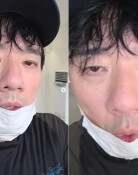Gov`t Released Funds Returning to Central Bank
Gov`t Released Funds Returning to Central Bank
Posted December. 20, 2008 03:57,
The Bank of Korea has released a massive amount of funds into the market, but the money is returning to the central bank instead of flowing into companies.
A record 41 trillion won (31.7 billion U.S. dollars) in short-term funds returned to the central bank Thursday, with the bank redeeming 13 trillion won (10 billion dollars) of the amount.
The Bank of Korea absorbed 11.5 trillion won (8.9 billion dollars) in excess liquidity from the banking sector through selloffs of repurchase agreements (RPs) last month, but the monthly figure through Friday reached 13 trillion won.
On Sept. 15, the central bank injected as much as 19.5 trillion won (15.1 billion dollars) in the market through RP purchases and other measures following the collapse of Lehman Brothers. The massive fund inflow increased the volume of short-term funds available in the banking sector.
Banks, however, have failed to single out companies deemed sound enough to be eligible for loans due to deteriorating corporate performance and delays in restructuring. They proceeded to park their funds again with the central bank.
The amount of net short-term liquidity the Bank of Korea absorbed from the market rose from 4.8 trillion won (3.7 billion dollars) in July to 8.2 trillion won (6.3 billion dollars) in August, but declined to seven trillion won (5.4 billion dollars) in September following Lehmans collapse.
The figure was 5.2 trillion won (four billion dollars) in October, but rose again last month.
The Bank of Korea controls the amount of short-term liquidity through RP transactions.
The Bank of Korea purchases government bonds and other securities held by banks for certain periods of time to increase market liquidity (RP purchases) if funds available in the market are inadequate. It sells RPs to absorb liquidity in the event of excessive liquidity in the market.
The central banks absorption of more excess liquidity from the market means excess short-term funds in the banking sector have increased to that extent. That is, funds released to the market return to the central bank after hanging around the banking sector.
This situation is apparently due to banks not adequately releasing funds to companies and households, as they run funds on a short-term basis ahead of closing their books at years end.
A Bank of Korea official said, We supply primarily short-term funds, and if banks do not convert them into long-term funds and lend them as corporate or other loans, the money inevitably returns to us.
Unless we absorb at least part of such funds, it could trigger market disruptions such as a plunge in short-term interest rates.
The central bank absorbs a minimum amount of the funds returned to it, and resends the remainder to the market in an aggressive measure to increase market liquidity. It absorbed 13 trillion won (10 billion dollars), or one third of the 41 trillion won (31.7 billion dollars) for which banks bid Thursday to sell seven-day RPs in their possession, and re-released the remainder to the market.
The central bank accepted only five trillion won (3.8 billion dollars), or about half of the 10.4 trillion won (eight billion dollars) for which banks sought to sell RPs in their possession, in its Dec. 11 bidding.
Hence, economists generally say that however aggressively the central bank pushes ahead with quantitative easing to inject more funds into the market, the credit crunch will continue to linger in the market unless the government takes qualitative measures such as speedy corporate restructuring and the expansion of loan guarantees offered by the Credit Guarantee Fund.
parky@donga.com sanjuck@donga.com




![[김순덕의 도발] ‘李부터 연임’ 개헌, 이 대통령은 가능성을 말했다](https://dimg.donga.com/c/138/175/90/1/wps/NEWS/IMAGE/2026/01/16/133172656.1.jpg)

![“설거지해도 그대로”…냄비 ‘무지개 얼룩’ 5분 해결법 [알쓸톡]](https://dimg.donga.com/c/138/175/90/1/wps/NEWS/IMAGE/2026/01/15/133164664.3.png)
